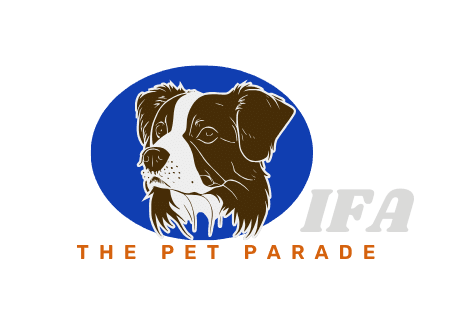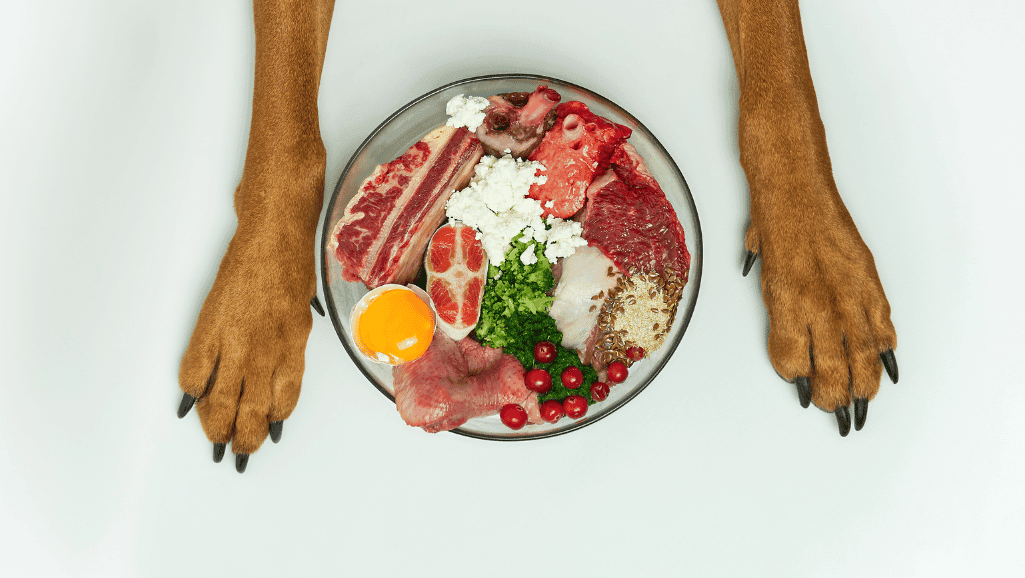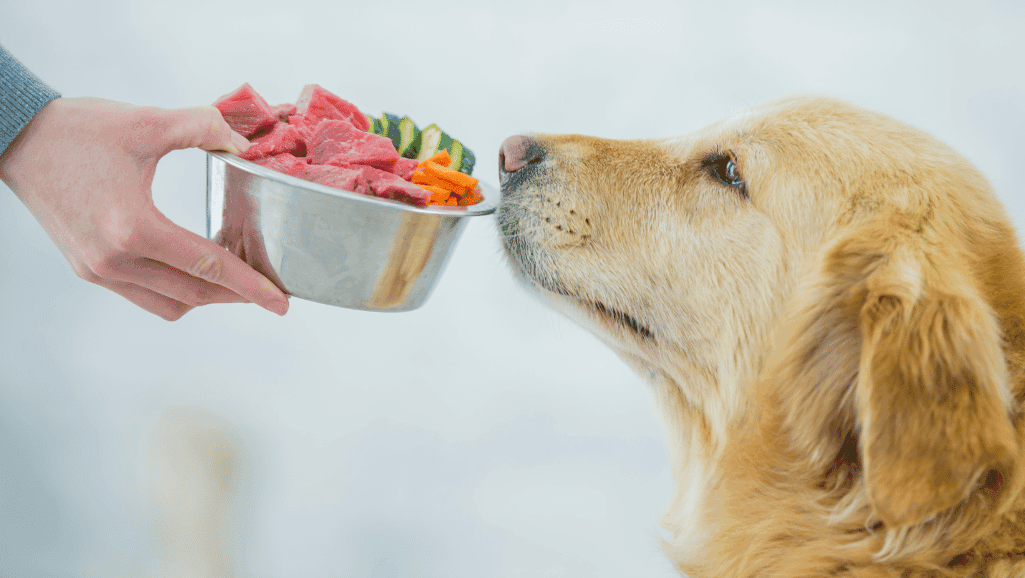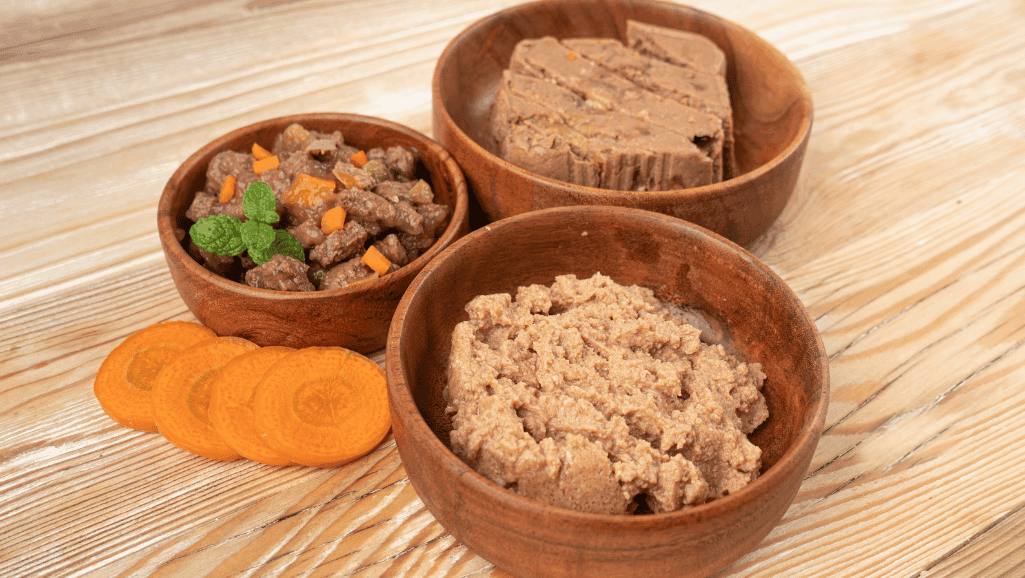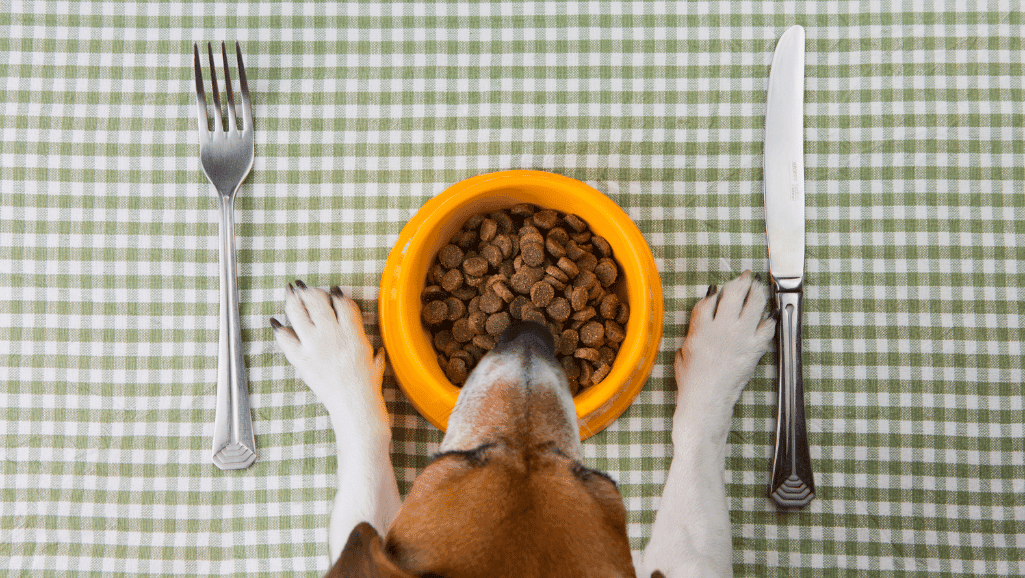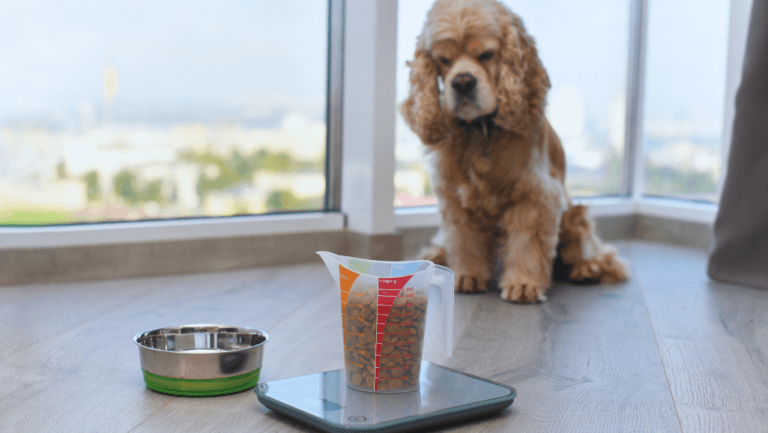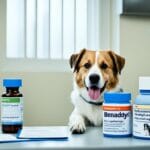Feeding your furry friend a balanced dog diet is key for their health and happiness. Dogs need proteins, fats, carbs, vitamins, and minerals, just like us. Knowing what your dog needs at each life stage is crucial for their nutrition.
When picking food for your dog, look at the dog food ingredients. Choose high-quality foods that fit their needs. Many pet foods are made with diet and nutrition dog in mind. But, it’s good to know about pet nutrition facts to choose the best for your dog.
Whether you choose dry kibble, wet food, or both, talk to your vet. They can make sure your dog’s diet fits their age, breed, size, and how active they are. Good nutrition helps your dog stay healthy, keeps them at a good weight, and makes them happy. For more tips on feeding your dog, check out this guide from VCA Animal Hospitals.
Key Takeaways
- A balanced diet is essential for your dog’s overall health and well-being
- Dogs require a variety of nutrients, including proteins, fats, carbohydrates, vitamins, and minerals
- Choose high-quality dog food ingredients that meet your pet’s specific dietary requirements
- Consult with your veterinarian to ensure your dog’s diet is appropriate for their individual needs
- Proper nutrition can help maintain a healthy weight, promote strong bones and muscles, and support overall health
Did you know Goldendoodles, a mix of Golden Retriever and Poodle, can live 10 to 15 years? Their diet, exercise, and vet care affect how long they live. To learn more about Goldendoodles and how to help them live long, healthy lives, visit Ifa The Pet Parade.
Understanding Your Dog’s Nutritional Needs
Feeding your dog a balanced canine diet is key for their health and happiness. Dogs need proteins, fats, carbohydrates, vitamins, and minerals, just like people do. Knowing what your dog needs helps you give them healthy dog meals.
Macronutrients: Proteins, Fats, and Carbohydrates
Proteins help build and repair your dog’s muscles, tissues, and organs. They also make hormones and enzymes. Good protein sources include meat, fish, and eggs.
Fats give your dog energy and help with vitamin absorption. They also keep their coat and skin healthy. Omega-3 and omega-6 fatty acids are important for brain health and fighting inflammation.
Carbs give energy and help with digestion. Choose complex carbs like whole grains and veggies over simple sugars.
Micronutrients: Vitamins and Minerals
Vitamins and minerals are crucial for many body functions. They support the immune system, bone health, and energy levels. Key vitamins for dogs are:
- Vitamin A for vision and immune function
- Vitamin D for bone health
- Vitamin E as an antioxidant
- B-vitamins for energy and nervous system function
Important minerals are calcium and phosphorus for bones and teeth. Zinc and iron help with immune function and carrying oxygen.
Water: The Essential Nutrient
Water is vital but often forgotten. It makes up 60-70% of a dog’s body and is needed for digestion, temperature control, and waste removal. Make sure your dog always has clean, fresh water.
“Proper nutrition is the foundation of your dog’s health. By understanding their unique nutritional needs, you can ensure they receive a balanced diet that supports their growth, development, and overall well-being.”
Dogs have different nutritional needs based on their age, breed, size, and activity level. Talk to your vet to find the best diet for your dog. This ensures they get the right nutrients for a healthy life.
Choosing the Right Dog Food
Choosing the right dog food is key to your pet’s health and happiness. With many options out there, picking the best one can be tough. Think about your dog’s age, breed, and diet needs to make a good choice.
Commercial Dog Food: Dry vs. Wet
Dog food comes in dry kibble and wet canned types. Both can be complete and balanced if they meet AAFCO standards. Dry kibble is easy to use, affordable, and good for teeth. Wet food is more moist, great for dogs with bladder issues or who drink less.
Some owners mix both dry and wet food for variety and to match their dog’s taste.
Reading Dog Food Labels
It’s important to know how to read dog food labels for a nutritious diet. Look for named protein sources like chicken or beef first, then whole grains, veggies, and healthy fats. Stay away from fillers, by-products, and artificial additives. Make sure the label has the AAFCO certification for nutritional standards.
AAFCO says dog food should have at least 22.5% protein for puppies and 18% for adults. But, top-quality foods often have 25% to 35% protein.
Considering Your Dog’s Life Stage and Breed
Think about your dog’s life stage and breed when picking food. Puppies need more protein, fat, and nutrients for growth. Big puppies should get special food to help them grow healthy and avoid joint problems.
| Dog Size | Age to Switch from Puppy to Adult Food |
|---|---|
| Small Dogs | 10-12 months |
| Medium-sized Dogs | 12 months |
| Large Dogs | 12-18 months |
| Giant Dogs | 18-24 months |
Adult dogs need a balanced diet for a healthy weight and daily activities. Senior dogs do well on lower-calorie food with more fiber for their health.
Some breeds have special diet needs due to their size, activity, or health issues. For example, big breeds might need food with less calcium and phosphorus to avoid joint problems. Always talk to your vet for the best food for your dog, especially if they have health issues or allergies.
Feeding Puppies: From Weaning to Adulthood
Feeding puppies right is key for their health and growth. It’s important to know their special needs and follow puppy feeding guidelines. Puppies start weaning at 3-4 weeks old and switch fully to solid food by 7-8 weeks.
When weaning, mix puppy food with water to make it like gruel. This helps puppies get used to eating solid food while still getting needed nutrients from their mom’s milk. By 8 weeks, most puppies are fully weaned.
Puppies need more protein, fat, calcium, and phosphorus than adult dogs. These nutrients help them grow fast and strong. The Association of American Feed Control Officials (AAFCO) says puppy food should have certain levels of these nutrients.
- Protein: 22-32%
- Fat: 10-25%
- Calcium: 0.7-1.7% for small to medium breeds, more for large breeds
- Digestible Carbohydrates: About 20%
Feed puppies small meals often during the day. Most eat three times a day, but adults usually eat twice. As they grow, you can feed them less often. Adjust how much you feed based on their age, breed, and weight to keep them at a healthy size.
| Breed Size | Age at Maturity |
|---|---|
| Toy and Small Breeds | 9-10 months |
| Medium Breeds | 12 months |
| Large Breeds | 15-24 months |
| Giant Breeds | 18-24 months |
Switch your puppy to adult food when they’re almost their full size. This depends on the breed, with smaller ones maturing by 10-12 months and bigger ones by 18-24 months. Change their food slowly over 7-10 days to mix puppy and adult food.
Keep treats to less than 10% of their diet to avoid obesity and keep their diet balanced.
Talk to your vet for advice on what and how much to feed your puppy. They can help you keep your puppy healthy and growing right.
Adult Dog Feeding Guidelines
Feeding your adult dog the right food is key to their health and happiness. You need to think about their age, breed, size, how active they are, and any health issues they might have. Knowing what your dog needs and following some simple rules will help them get the right nutrition.
Determining Portion Sizes
How much food your adult dog needs changes based on their size, age, breed, and how active they are. Most adult dogs need about 25 to 30 calories per pound of body weight each day. But, this can change based on your dog’s unique needs. Start by looking at the food packaging for guidelines, then adjust as needed based on your dog’s look and weight.
Look for these signs to check if your dog is at a healthy weight:
- An hourglass figure when viewed from above
- Ribs that are easily felt but not visible
- A tucked-up abdomen
- A visible waist behind the ribs
If your dog is too heavy or too light, change their food amounts. About one in four dogs is overweight, so keep an eye on your dog’s weight and adjust their food as needed to keep them healthy.
Feeding Frequency
Most adult dogs do well with two meals a day, one in the morning and one in the evening. This helps keep their blood sugar stable and stops them from eating too much. But, some dogs, like very active ones or those in extreme weather, might need smaller meals more often.
The American Society for the Prevention of Cruelty to Animals says no more than 5% of a dog’s calories should come from treats, but up to 20% is okay.
When setting a feeding schedule for your adult dog, think about what they need and like, and stick to a routine.
Adjusting for Activity Level and Environment
How active your dog is and where they live affects how many calories they need. Active dogs or those in cold places might need more calories to stay healthy. Less active dogs or those in warm places might need fewer calories. Change their food amounts and how often they eat based on this, and watch their weight to keep them healthy.
| Dog Size | Daily Calorie Requirements | Recommended Daily Portion |
|---|---|---|
| Toy Breeds (3-12 lbs) | 200-400 calories | 1/4 to 1 cup |
| Small Breeds (12-25 lbs) | 400-700 calories | 1 to 1 2/5 cups |
| Medium Breeds (25-50 lbs) | 700-1,200 calories | 2 to 2 2/3 cups |
| Large Breeds (50-100 lbs) | 1,200-2,000 calories | 2 4/5 to 3 cups |
These are just basic guidelines. Your dog might need something different. Always talk to your vet to find the best food and amounts for your dog, and adjust as needed to keep them healthy and well-fed.
Senior Dog Nutrition: Meeting Changing Needs
As our beloved dogs get older, their diet needs change. Big breeds like Great Danes and Mastiffs may need special care as early as 5-8 years old. Smaller breeds like Chihuahuas and Yorkies start needing it around 10-12 years old. It’s key to adjust their diet to keep them healthy and happy.
One big change is that older dogs need fewer calories. By 11 years old, they might only need 75% of the calories they used to. This is because they move less and can easily gain weight if their food isn’t right.
To stop weight gain, senior dog food often has fewer calories and fats. The right amount of fat is 7% to 15% dry matter. If your dog tends to get fat, it should be 7% to 10%. They also need good protein, 15% to 23% dry matter, to keep their muscles strong.
Around 40% of dogs are 7 years or older, and by 2022, most dog homes in the U.S. had senior dogs.
Senior dogs also need supplements for their health. Supplements like glucosamine and chondroitin can ease arthritis pain and help their joints. High-fiber foods are good for dogs with constipation or digestive problems.
Older dogs do better with smaller, more frequent meals. This helps keep their blood sugar stable and lowers the risk of digestive issues. If your senior dog doesn’t like dry food, adding warm water or canned food can make eating easier.
| Dog Size | Senior Age | Life Expectancy |
|---|---|---|
| Small (under 20 lbs) | 8-9 years | 15-20 years |
| Medium (20-50 lbs) | 7-8 years | 12-15 years |
| Large (50-90 lbs) | 6-7 years | 10-12 years |
| Giant (over 90 lbs) | 5-6 years | 8-10 years |
Working with your vet is key to making a diet plan for your senior dog. Some older dogs need special diets for health issues like heart disease or kidney problems. With the right diet and supplements, you can help your senior dog live a great life.
Homemade Dog Food: Pros, Cons, and Precautions
Many dog owners are choosing homemade dog food to give their pets a natural diet. Making your dog’s meals at home has its perks, but it’s key to know the risks and challenges. Creating a balanced diet for your dog at home is not easy.
One big plus of homemade dog food is controlling the ingredients’ quality and variety. You can pick fresh, top-notch proteins, carbs, and veggies to match your dog’s needs and likes. This is great for dogs with food allergies or special diets.
But, making a balanced homemade diet can be tough. A study by the University of California, Davis, found 95% of homemade diets lack an essential nutrient. Common missing nutrients include zinc, choline, copper, and calcium. Without these, your dog could face serious health issues.
“Homemade diets are not necessarily healthier,” warns Dr. Jennifer Larsen, a veterinary nutritionist at the University of California, Davis. “If not formulated properly, they can be quite dangerous.”
To make sure your homemade dog food is right for your pet, follow these tips:
- Get advice from a vet nutritionist to create a recipe that fits your dog’s age, size, breed, and health.
- Use a mix of quality protein sources like lean meats, fish, and eggs for amino acids.
- Add complex carbs like brown rice, sweet potatoes, and oatmeal for energy and fiber.
- Put in healthy fats and oils, such as fish oil or flaxseed oil, for skin and coat health.
- Use a vet-approved multivitamin and mineral supplement for all the needed micronutrients.
Homemade dog food also means careful prep and storage to avoid foodborne illness. Always wash your hands, use clean tools, and store food safely in the fridge or freezer.
While making your dog’s food can be rewarding, think about the time and money it takes versus the benefits. If you choose a homemade diet, keep a close eye on your dog’s health and adjust as needed with your vet.
Diet and Nutrition Dog: Ensuring a Balanced Diet
Ensuring a balanced dog diet is key for your pet’s health and happiness. It should have proteins, fats, carbs, vitamins, minerals, and water. These nutrients support body functions, skin, coat, digestion, and the immune system.
Protein Sources for Dogs
Protein is crucial for your dog’s skin, hair, muscles, organs, and tissues. Good sources include meat, poultry, fish, and eggs. Plants like legumes and grains also offer protein. The AAFCO suggests at least 18% protein for adult dogs and 22.5% for puppies or those pregnant or nursing.
Healthy Fats and Oils
Healthy fats and oils are vital for your dog’s skin, coat, brain, and reducing inflammation. AAFCO recommends at least 5.5% fat for adult dogs and 8.5% for puppies or pregnant and nursing dogs. These fats provide energy, help with heat loss, and support eye and brain health.
Carbohydrates and Fiber
Dogs don’t need carbs to live, but they offer energy and fiber for digestion and nutrient absorption. Choose complex carbs like whole grains and veggies over simple sugars. Fiber keeps the digestive system healthy and helps with bowel movements. Carbs in a dog’s diet depend on their age, breed, and activity level.
| Nutrient | Importance | Recommended Amount |
|---|---|---|
| Protein | Builds and maintains tissues | 18% for adults, 22.5% for puppies and pregnant/nursing dogs |
| Fat | Energy source and promotes healthy skin and coat | 5.5% for adults, 8.5% for puppies and pregnant/nursing dogs |
| Carbohydrates | Energy source and provides fiber for digestion | Varies based on life stage and activity level |
| Vitamins | Support immune system and metabolic function | 11+ essential vitamins |
| Minerals | Support body functions and bone health | 12 essential minerals |
A balanced diet is the foundation of a healthy and happy dog. Work closely with your veterinarian to ensure your dog’s nutritional needs are being met throughout their life stages.
Give your dog a diet with the right mix of nutrients for a healthy weight, strong immune system, and overall well-being. Always talk to your vet to find the best diet for your dog.
Treats and Supplements: Moderation is Key
Treats are great for rewarding your dog and encouraging good behavior. But remember, moderation is key. Healthy dog treats should not make up more than 10% of your dog’s daily calories. This keeps your dog’s diet balanced and prevents weight gain and health problems.
Healthy Dog Treat Options
Choose low-calorie treats made from quality ingredients for your dog. Great options include:
- Small pieces of cooked lean meat, such as chicken or turkey
- Fresh vegetables, like carrots or green beans
- Bite-sized fruits, such as apple slices or blueberries
- Natural, minimally processed dog treats from reputable brands
Avoid treats high in sugar, salt, or artificial additives. These can harm your dog’s health. Opt for natural treats like Dogsee for their high nutrient value and fewer calories. Look for treats that also support your dog’s health, like oral health or coat maintenance.
| Treat | Price |
|---|---|
| Wild Venison Chews | $16.95 |
| Lip Smackin’ Lamb Lung | $16.95 |
| Biggie Roo Burgers | $16.95 |
| Fish N Chips Baby | $16.95 |
| Rockin Roo Tendon | $16.95 |
| Rockin Roo Trail Mix | $16.95 |
| The Breath Freshener | $16.95 |
| Honey Infused Chicky Chews | $16.95 |
| Mighty Liver Munchies | $16.95 |
| Mini Roo Burgers | $16.95 |
| Rockin Roo Chews | $16.95 |
| Cluckin Good Nuggets | $16.95 |
| Cluckin Good Chews | $16.95 |
| Cluckin Good Jerky | $16.95 |
| Groovy Goat Horn | $11.90 |
| Rockin Roo Jerky | $16.95 |
When to Consider Supplements
Most dogs get all they need from a balanced diet. But some may need supplements. Dogs with joint issues, skin problems, or digestive issues might benefit from supplements.
Nutrition experts suggest that treats should not make up more than 5% of a puppy’s calories. This highlights the importance of balanced nutrition for growing dogs.
Always talk to your vet before starting supplements. They can tell you if your dog needs them and recommend the best options. Supplements should not replace a balanced diet or proper vet care.
By following these guidelines and giving treats and supplements in moderation, you can keep your dog healthy and happy for a long time.
Common Nutritional Issues in Dogs
As a dog owner, knowing about nutritional issues is key to your pet’s health. These issues can affect your dog’s well-being. We’ll look at three main problems: obesity, food allergies, and digestive issues.
Obesity and Weight Management
More than half of American dogs are overweight. Many owners think their dogs are the right weight when they’re actually obese. Being overweight can cause serious health problems like diabetes and heart disease.
To prevent obesity, feed your dog the right amount, limit treats, and make sure they exercise. Talk to your vet to find out the best weight for your dog and get diet advice.
Learn more about diet-related diseasesin
Food Allergies and Intolerances
Food allergies and intolerances can make dogs itchy, cause ear infections, and upset their stomachs. Common culprits include beef, dairy, wheat, and soy. If you think your dog has an allergy or intolerance, work with your vet to find and remove the problem foods.
Some dogs do well on special diets like those with novel proteins or hydrolyzed foods. But, a raw diet might not be good for all dogs, especially those with weak immune systems or health issues.
Digestive Problems
Issues like vomiting, diarrhea, and constipation can have many causes. To keep your dog’s digestion healthy, feed them a steady, balanced diet and don’t change their food suddenly. High fiber can help with diarrhea.
If your dog has ongoing digestive problems, see your vet to check for serious issues and get help.
| Nutritional Issue | Causes | Prevention/Management |
|---|---|---|
| Obesity | Overfeeding, lack of exercise | Measure portions, limit treats, regular exercise |
| Food Allergies | Beef, dairy, wheat, soy | Eliminate allergens, novel protein sources, hydrolyzed diets |
| Digestive Problems | Dietary indiscretion, parasites, underlying health issues | Consistent, balanced diet, avoid sudden changes, high fiber for large bowel diarrhea |
Knowing about these nutritional issues and working with your vet can keep your dog healthy and happy.
Working with Your Veterinarian for Optimal Nutrition
Your veterinarian is key to making sure your dog gets the right food. They offer expert advice on what your dog needs. Whether you choose store-bought food or make meals at home, they can guide you.
If your dog has health issues like food allergies or digestive problems, your vet can suggest diet changes. They can also recommend special diets. Regular vet visits help keep an eye on your dog’s health and adjust their diet as needed.
“Collaborating with your veterinarian is essential for ensuring your dog receives optimal nutrition throughout their life stages. They can provide expert guidance and help you navigate the complexities of canine nutrition.”
Don’t be shy to ask your vet for nutrition advice during your visits. They can help you:
- Choose the right food for your dog’s age, breed, and health
- Figure out the right amount to feed your dog
- Check your dog’s body condition and tweak their diet if needed
- Recommend supplements or special diets when necessary
Remember, your vet is your ally in keeping your dog healthy and happy. By working together and following their advice, you can make sure your dog gets the best care. This way, your furry friend can live a long, happy life with you.
| Key Indicators of a Dog’s Nutritional Status | Ideal Range |
|---|---|
| Body Weight | Maintain a healthy weight, avoid obesity |
| Stool Quality | Firm, well-formed stools |
| Coat and Nail Quality | Shiny, healthy coat; strong, non-brittle nails |
| Energy Level | Active, alert, and engaged in daily activities |
Conclusion
It’s key to make sure your dog gets the right diet for their needs. This article has given you tips on what your dog should eat. It covers the basics of nutrition, choosing the best food, and how much to feed them.
A good diet for dogs includes the right mix of proteins, carbs, and fats. It should have enough amino acids and come from sources like meat, milk, and fish. Working with your vet is also important for your dog’s health.
They can help with issues like obesity, allergies, or digestive problems. Keeping up with the latest in dog nutrition helps prevent diseases. And remember, good food doesn’t have to be expensive. Giving your dog healthy treats in small amounts is okay too.
By focusing on your dog’s nutritional needs, they can stay happy and healthy for a long time. Every dog is different, so what suits one might not suit another. Always be ready to adjust and get advice from experts if needed.
With dedication and the right knowledge, you can ensure your dog lives a long, healthy life. This is the best way to show your dog love and care.
